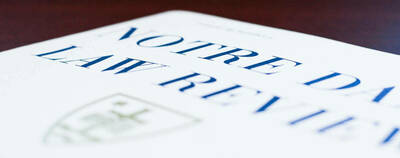Notre Dame Law Review hosts symposium on ‘Speech and Religious Exercise in the Workplace’

The Notre Dame Law Review, in collaboration with Notre Dame Law School’s Religious Liberty Initiative, hosted a symposium on January 26 in the McCartan Courtroom. Centered on the theme “Speech and Religious Exercise in the Workplace,” the symposium brought together religious liberty experts to speak about their written scholarship on the importance of religious liberty protections in the workplace.
The panelists included Steven Green of Willamette University, Steven Collis of The University of Texas at Austin, Robin F. Wilson of the University of Illinois, Perry Dane of Rutgers Law School, and Netta Barak-Corren of Hebrew University. Notre Dame Law School professors Stephanie Barclay, founder of Notre Dame Law School’s Religious Liberty Initiative, and Richard Garnett, director of the Law School’s Program on Church, State & Society, moderated the panel discussions.
Nathaniel Schetter, editor-in-chief of the Notre Dame Law Review, said, “The Notre Dame Law Review was honored to welcome this estimable group of scholars to the Law School and hear their perspectives on free speech and religious exercise in the workplace. Their thoughtful essays will make important contributions to this timely question as legal practitioners and scholars alike process the new developments in the doctrines of free speech and religious exercise.”
Green spoke about the importance of protecting private religious speech and expression, especially in public schools. Focusing on the case Kennedy v. Bremerton School District, Green said that the “rules governing teacher religious expression should apply with equal force to coaches.”
Kennedy v. Bremerton School District is a case that concerns a school district’s suppression of a football coach’s private prayer after football games. The Bremerton School District first prohibited coach Joseph Kennedy from praying on the field where others could see him and later fired him when he continued to do so.
“Coaches are teachers. They take on the same responsibilities and work in the same capacity,” Green added.
Collis continued the conversation about the Kennedy case, discussing the coercion test and the endorsement test as standards for religious speech by school employees, and addressing the differences between the two tests.
“All of these ideas are consistent with the notion of religious volunteerism, the notion that the government should not be interfering with our voluntary religious choices,” he said.
“The government is having a tremendous impact on people’s religious exercise. When people are coerced to choose between their jobs or their religious exercise, it presents a burden.”
Following Collis, Wilson and State Representative Michael Petersen jointly delivered their presentation, “Ordinary Conscience & Pretend Offenses.” Wilson and Petersen have been working together on legislation in Utah.
They spoke in-depth about Title VII, which requires employers to reasonably accommodate the religious practices of an employee, unless doing so would create an “undue hardship” on the employer.
Wilson said, “The promise of Title VII is that people need not check their religious convictions at the office door. But so many people are left out of Title VII’s religious liberty protections, even after Groff v. DeJoy. There are still swathes of employees that are left out of Title VII entirely.”
Wilson provided reasons why employees may not be able to claim the Title VII protection, citing potential financial barriers, the size of the company, and an employee’s conviction being moral rather than religious.
In the second panel discussion, Barak-Corren centered her talk on the case 303 Creative v. Elenis, which deals with the intersection of anti-discrimination law in public accommodations with the Free Speech Clause of the First Amendment.
She said, “Nobody can dispute that this case is about pure speech. What are the ingredients of pure speech? These are words and expressions. These are customized messages and ideas, and importantly, these are [Lorie Smith’s] own messages and ideas.”
She also indicated that the definition of pure speech is a glaring omission in the opinion by Justice Gorsuch.
“It is very important for the Court to not just select the right cases, but also convey their decisions clearly to the public. Explain what the decision actually does,” said Barak-Corren.
Dane wrapped up the second panel discussion, giving a holistic account of the structures of freedom of religion and freedom of speech and their relationship with one another. He described these freedoms in relation to the Supreme Court’s opinion in 303 Creative.
He also spoke in great detail about culture and identity, saying, “Partisan identity is increasingly driving religious beliefs rather than the other way around. Dignitary interests are, to an extent, culturally constructed. What offends us and what hurts us is a product of our own cultural understanding.”
The authors’ written scholarship will be published in a special edition of the Notre Dame Law Review Reflection, the Law Review’s online edition, later this spring.
Originally published by at religiousliberty.nd.edu on February 15, 2024.